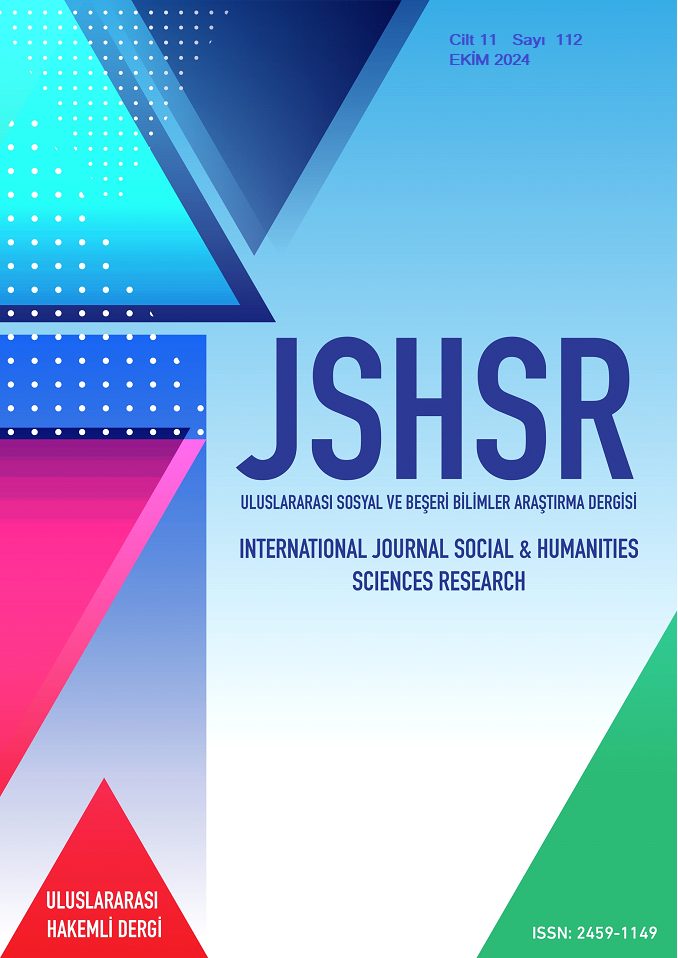The Reflection of Armistice Period Istanbul on Turkish Poetry
DOI:
https://doi.org/10.5281/zenodo.14020391Keywords:
Istanbul, Armistice Period, poetryAbstract
One of the darkest periods that Istanbul experienced was the Armistice Period. Istanbul remained under occupation during this five-year period, which started with the Armistice of Mudros in 1918 and ended with the Treaty of Mudanya in 1923. During the occupation years of Istanbul, Beyoğlu in particular became a district where the invaders lived as they wished. Foreign flags were hung all over Beyoğlu, in an attempt to distance this district from being a Turkish district in appearance. The years of occupation of Istanbul also caused great destruction in the spiritual world of the people. While the people are struggling to survive with the poverty brought on by the war, they are also struggling with the pessimistic atmosphere of the occupation. The occupation forces mistreat the people during the occupation and try to make their lives difficult. The people of Istanbul feel the psychological devastation caused by the occupation in every aspect The Armistice Period was the subject of Turkish poetry, and the pessimistic mood created by the occupation was also mentioned in the poems. In this study, it is discussed how the occupation of Istanbul was reflected in the poems about Istanbul during the Armistice Period
References
Aydemir, Ş., S.(2021). Tek adam (cilt:2). Remzi Kitabevi.
Bozkurt,A.( t.y.) . İstanbul’un İşgali, https://ataturkansiklopedisi.gov.tr/bilgi/istanbulun-isgali/.
Dağlarca, F. H. (1951). İstiklâl savaşı, (Samsun’dan Ankara’ya). Marmara Basımevi.
Demir, M. (2014), Mütareke yılları İstanbul’unda toplumsal yapıyı etkileyen olaylardan yansımalar. Bartın Üniversitesi Çeşmi Cihan: Tarih Kültür ve Sanat Araştırmaları E- Dergisi, 1,(2), 22-23. Bartın.
Eloğlu, M. (1957).Sultan palamut. SHD Yayınları.
Erden, M.,Ş.(1953). Adsız pınar. Hüsnütabiat Basımevi.
Halikarnas Balıkçısı (2018). Mavi sürgün. Bilgi Yayınevi.
Kacıroğlu, M. (2009), Millî mücadele ve erken dönem cumhuriyet romanında harp zenginleri. Karadeniz Araştırmaları, 20, s.117-136.
Ölmez, İ. A. (1941). Vakitsiz sönen yıldızlar. Bozkurt Basımevi.
Pamuk, Ş.(2017). Osmanlı- Türkiye iktisadi tarihi 1500-1914. İletişim Yayınları
Pepeyi, H., N., (1936). Çanakkale. Becid Basımevi.
Pepeyi, H., N. (1938). Mütareke. Becid Basımevi.
Refi Cevad (1919,24 Temmuz). “Hürriyet Bayramı”, Alemdar Gazetesi, s.1.
Süleyman Nazif (1919, Şubat 9).“Kara Bir Gün”. Hadisat Gazetesi.
Tansel, S., (1977).Mondros’tan Mudanya’ya kadar I. Milli Eğitim Bakanlığı Yayınları.
Toprak, Z., (2019a, Nisan), İşgal ve travma: mütareke yıllarında İstanbul’da hayat, Magma Baykuş, 45, 2-15.
Toprak, Z., (2019b). Türkiye’de milli iktisat (1908-1918). Türkiye İş Bankası Kültür Yayınları
Tuna, P.(2022), İşgal İstanbul’unda Fransız millî bayramı kutlamaları (1919-1923). Atatürk Araştırma Merkezi Dergisi, Güz 2022, S 106, s. 431-472.
Tunçay, M.,(2015), “Mütareke İstanbul’u”, C:2, İBB Kültür A.Ş Yayınları.
Zürcher, E., J. (1988). Modernleşen Türkiye'nin tarihi. İletişim Yayınları.
Downloads
Published
How to Cite
Issue
Section
License
Copyright (c) 2024 INTERNATIONAL JOURNAL OF SOCIAL HUMANITIES SCIENCES RESEARCH

This work is licensed under a Creative Commons Attribution 4.0 International License.


